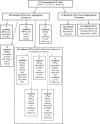Using Unannounced Standardized Patients to Explore Variation in Care for Patients With Depression
- PMID: 29946385
- PMCID: PMC6008039
- DOI: 10.4300/JGME-D-17-00736.1
Using Unannounced Standardized Patients to Explore Variation in Care for Patients With Depression
Abstract
Background: Physicians across specialties need to be skilled at diagnosing and treating depression, yet studies show underrecognition and inadequate treatment. Understanding the reasons requires specifying the influence of patient presentation, screening, and physician competence.
Objective: We deployed an unannounced standardized patient (SP) case to assess clinic screening and internal medicine (IM) residents' practices in identifying, documenting, and treating depression.
Methods: The SP represented a new patient presenting to the outpatient clinic, complaining of fatigue, with positive Patient Health Questionnaire (PHQ) items 2 and 9 and a family history of depression. The SPs assessed clinic screening and IM resident practices; appropriate treatment was assessed through chart review and defined as the resident doing at least 1 of the following: prescribing a selective serotonin reuptake inhibitor (SSRI), making a referral, or scheduling a 2-week follow-up.
Results: Of 129 IM residents, 85 (66%) provided appropriate treatment, 79 (61%) appropriately referred, 59 (46%) prescribed an SSRI, and 49 (38%) scheduled a 2-week follow-up, while 40 (31%) did not add depression to the problem list. The IM residents who used PHQ-2 and PHQ-9 were more likely to appropriately (89%) versus inappropriately (50%) treat (P < .001). Compared with those who did not, residents who treated appropriately assessed depression symptoms more (P < .001) and had better communication (73% versus 50%, P = .02), patient centeredness (74% versus 42%, P = .03), and patient activation skills (35% versus 11%, P < .001).
Conclusions: The use of unannounced SPs helps identify targets for training residents to provide evidence-based treatment of depression.
Conflict of interest statement
Conflict of interest: The authors declare they have no competing interests.
Figures
References
-
- Petterson S., Miller BF., Payne-Murphy JC., et al. Mental health treatment in the primary care setting: patterns and pathways. Fam Syst Health. 2014; 32 2: 157– 166. - PubMed
MeSH terms
LinkOut - more resources
Full Text Sources
Other Literature Sources
Medical


